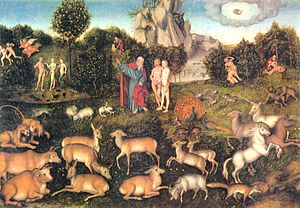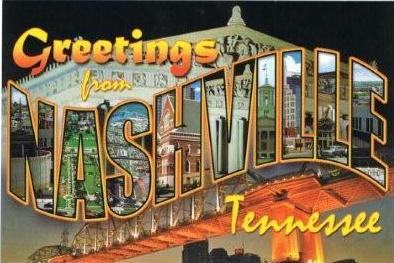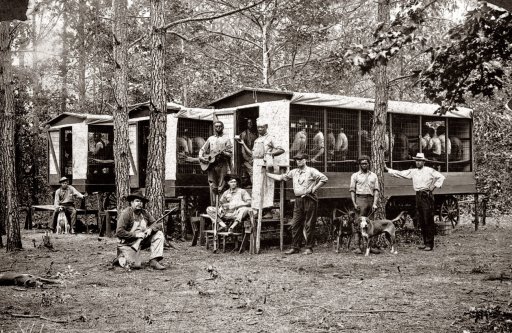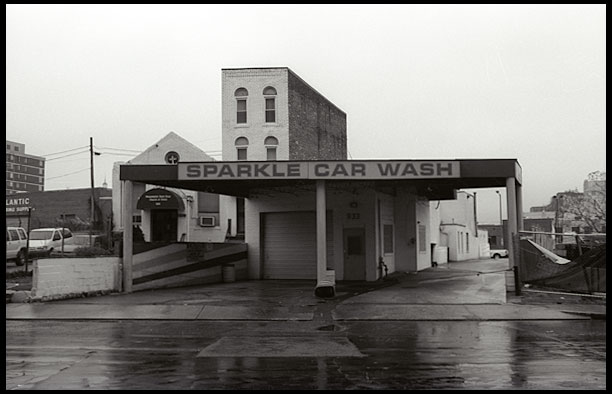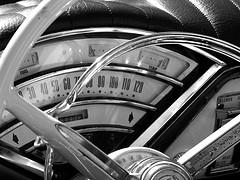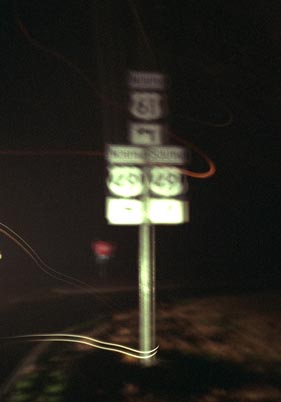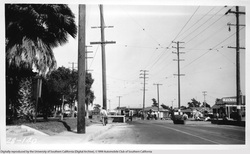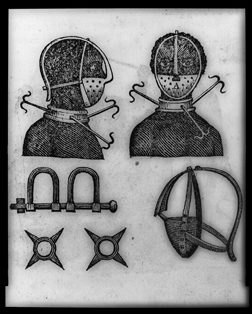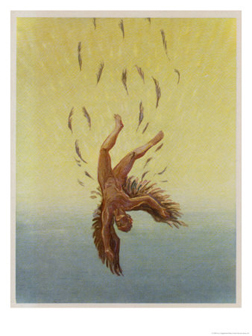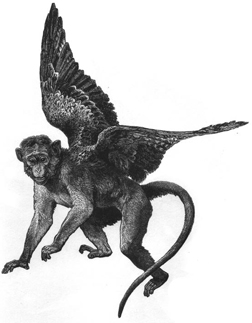Tunnel Vision
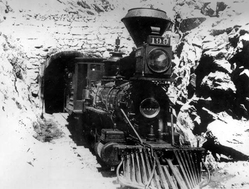
Leon Fullerton often said: "I'm like every other goddamn atheist. I think about God all the time."
An erratic visionary, perhaps, but a visionary nonetheless. A guest of a brakeman who was teaching Fullerton to yodel in exchange for leads on promising entertainment on the Chitlin Circuit, the vision that came to Fullerton while riding on the back caboose platform of a train traversing the Montana Rockies was of Our Lady of Guadalupe emblazoned in cold, blue fire on the wall of a high tunnel that conjoined the east and west slopes of the Great Divide.
"Patron saint of Mexico and Tennessee," Fullerton is said to have said of OLoG. "And the UFW, too. And, bro, don't Our Lady good in blue?"
In one of his many quixotic quests for sobriety, Fullerton spent a winter in Maryland fasting and meditating and taking walks with the poet monk Thomas Merton. As Fullerton recounts in the liner notes to his magic-mushroom-inspired album Sometimes A Great Potion, “Tommy knew what you were thinking even when you didn’t. He turned me on to the stuff his crazy girlfriend [Flannery] O’Connor wrote, and it just opened up a whole new way of reading the Bible. Out in Washington, I tracked young Ray Carver down at a laundromat, and we got to talking while his kids were running around, and it turned out O'Connor was a big influence on his whole God-as-regular-Joe thing, too.”
In a 1999 Spin interview, Joan Osborne gives a nod to O'Connor, Carver, and Fullerton for planting in her head the great notion of God as a slob on a bus. “Those folks, the Typewriter Trinity, they just got it. I’d rent out my soul to write one song as good as [Fullerton's] “Hard Rock Hammer” or one story as good as [Carver's] “Cathedral” or [O'Connor's] "A Good Man Is Hard To Find."
Songs on this page:
An erratic visionary, perhaps, but a visionary nonetheless. A guest of a brakeman who was teaching Fullerton to yodel in exchange for leads on promising entertainment on the Chitlin Circuit, the vision that came to Fullerton while riding on the back caboose platform of a train traversing the Montana Rockies was of Our Lady of Guadalupe emblazoned in cold, blue fire on the wall of a high tunnel that conjoined the east and west slopes of the Great Divide.
"Patron saint of Mexico and Tennessee," Fullerton is said to have said of OLoG. "And the UFW, too. And, bro, don't Our Lady good in blue?"
In one of his many quixotic quests for sobriety, Fullerton spent a winter in Maryland fasting and meditating and taking walks with the poet monk Thomas Merton. As Fullerton recounts in the liner notes to his magic-mushroom-inspired album Sometimes A Great Potion, “Tommy knew what you were thinking even when you didn’t. He turned me on to the stuff his crazy girlfriend [Flannery] O’Connor wrote, and it just opened up a whole new way of reading the Bible. Out in Washington, I tracked young Ray Carver down at a laundromat, and we got to talking while his kids were running around, and it turned out O'Connor was a big influence on his whole God-as-regular-Joe thing, too.”
In a 1999 Spin interview, Joan Osborne gives a nod to O'Connor, Carver, and Fullerton for planting in her head the great notion of God as a slob on a bus. “Those folks, the Typewriter Trinity, they just got it. I’d rent out my soul to write one song as good as [Fullerton's] “Hard Rock Hammer” or one story as good as [Carver's] “Cathedral” or [O'Connor's] "A Good Man Is Hard To Find."
Songs on this page:
- Paradiseland
- Nashville
- Hard Rock Hammer
- Burn Like a Wheel
- He's There
- Next Time I'm In L.A.
- The Price
- Icarus
- The Monkey's Business
_______________________________________
|
1. Paradiseland
copyright Leon Fullerton It was early Sunday morning,
Adam said to Eve, “There's so much damn temptation here-abouts, sure am glad that we believe.” Oh, honey, take my hand, woman and man were made to understand. Oh, honey, take my hand, follow me down from the Paradiseland. Eve said, “That’s a very good boy, that’s just what you’re supposed to say. It’s a covenant of the spirit -- but flesh was never made that way!” Oh, honey.... Eve said, “And another thing: I’m such a lucky little wife, ‘cause I got you, and I got Paradise, and I got eternal life!” Oh, honey.... Adam said, “I don’t need none of that other stuff, long as I got you, and I will abide till death do us part, no matter what you do.” Oh, honey.... Paradise is a very nice place, the Good Book says it’s so. Must take some kind of a powerful love to turn your back on the Paradise door. Oh, honey..... |
“Adam is my favorite cat in the Bible,” Fullerton once wrote to his daughter, Gwen. “He’s the guy who said, ‘Yeah, you’re my God, man, but, like, she’s my wife!’”
“Dad thought it was absolutely essential for guys to stay with their wives through thick and thin,” Gwen explained to Rex Geronimo, Fullerton’s biographer, “— as long as the wives weren’t his.” Recording session:Recorded at White Rock Grange, Gorham, Maine, October 2016.
With: Bob Barton, Charlie Bernstein, Paul Hunt, Jim Katsiaficas, Sue Silvestri, and Waterford Slim Live show:Recorded at Riverside Park, Westbrook, Maine, July 2016.
With: Bob Barton, Charlie Bernstein, Paul Hunt, Jim Katsiaficas, Sue Silvestri, and Waterford Slim |
_______________________________________
|
2. Nashville
copyright Leon Fullerton Bobby met Mona outside of a Music City Piggly Wiggly.
She was hawking vintage vinyl from the back of a Chevy van. She said, “Hey, mister, how about a fine-condition Reno and Smiley LP?” And he said, “Hey, sister, how about a fine-condition man?” So that summer they visited the Rock ‘n’ Roll Hall of Fame, ‘cause she was a singer, and that fall they took the Graceland Sunday tour, ‘cause he had religion, and that winter they jumped for junk jewelry down on Rampart Street, but that spring he lost her to a Nashville backstage door. She said, “I believe in Smokey Robinson. But Miracles? Mm, we’re just gonna have to wait and see, ‘cause maybe there a heaven and hell and love and forever, but for right now, it’s all I can do to believe in me.” So Bobby’d like awake nights spinning Mona’s moldy oldies: Dixie Cups, Bobby Womack, Desmond Decker, Patti LaBelle. And then one night Mona phoned him after a lounge gig in Decatur, and they talked for hours, and when they hung up, you know, they wished each other well. She said, “You’re gonna see me one day in the Rock ‘n’ Roll Hall of Fame. Shoot, you could even see me on the Graceland Sunday Tour. You might see me jump for junk jewelry down on Rampart Street. But someday, Bobby, you might never see me again no more, “because I believe in Smokey Robinson. But Miracles? Mm, we’re just gonna have to wait and see, ‘cause maybe there’s a heaven and hell and love and forever and God and forgiveness, but for right now, Bobby, it’s all I can do just to believe in me.” And that’s the last thing she said to him: “Believe in me, Bobby, believe in me, believe in me,” and it still rings in his head just like a skid row matins mantra: “Believe in me, Bobby, believe in me, believe in me, believe in me.” |
This first appeared on Fullerton’s 1980 album, a horn-driven project entitled All Messed Up and No Place to Blow. “It was one of those small-world stories,” he told Tom Wheeler in his second Guitar Player interview.
“I was down in Nashville flattering, cajoling, arm-twisting, threatening, shaming, bribing, and misleading people for the album, and I heard about this guy who sold some nice old vintage vinyl. Fred 'Steady-cruisin’' Magnusen. Had a great little record shop. It’s not on Music Row. It takes a map and a flashlight to find it. But enough people know about it to keep him in Orange Crush and Fritos. The Vinyl Solution. You’ve maybe heard of it. Legendary. I don’t know where Bobby is now. “Anyhow, I went down to his shop, and he showed me some really great old stuff, collectibles. I picked up a Reno and Smiley record, and he said it was a copy of that LP that got him started. Asks me, did I know Mona Lambert of Mona Nucleosis and the Kissing Dizzies? “I said yeah, sure, and he told me this story. Which I put into All Messed Up as sort of a break from all the brass chaos. A nice little laid-back guitar-backed ballad, the eye of the horn hurricane. “What I didn’t tell him was, shoot, yeah, I knew Mona, alright, and I knew she was was in very bad shape. Very bad. She’d cancelled some shows and had one foot in the hoosgow and the other in rehab. I’d seen her at a party in Austin a few weeks back. She was dating a trombone player friend of mine, T-Bone Tennenbaum, who did that great solo on “Sometimes a Woman (Just Gotta Shoot Her Man)," the first track on the flip side. And she had all the healthy glow of a tombstone. Never heard whether she pulled out of it. “But I didn’t tell him that. I figured, he’d find out, but I wasn’t going to bust his bubble. He believed in her.” |
_______________________________________
|
3. Hard Rock Hammer
copyright Leon Fullerton Met Jesus on a chain gang,
I said, "Lord, what have you done?" He said, "Last thing I remember, I was looking for some fun. Well, I can take them sins from you," he told me with a smile, "If you will take this hammer and go that extra mile." Take this hard rock hammer, bring it down, bring it down, take this hard rock hammer, brother, won't you bring it down? Take this hard rock hammer, bring it down, bring it down. You're a half a mile from heaven and a hundred miles, a hundred miles from town. I met the twelve apostles in a bar in San Antone. I didn't have the heart to tell them how I craved to be alone. They were headed out for supper, so I stood them for a round. They were lean, and they were thirsty, and in me a friend they'd found. Take this.... You're a thousand miles from heaven and a hundred miles, a hundred miles from town. Last time I saw God he was filling up his tank. In the chaos, I confused him for another Midland crank. I was up four hundred dollars, a six-pack, and some porn when I was finally apprehended at a car wash in Van Horn. Take this... You're a thousand miles from nowhere and a hundred miles, a hundred miles from town. Mary Magdalene was like a sister to me. We worked together making license plates back in '53. I said, "Why don't we crash out of here? Since when is vice a crime?" She said, "Don't matter where you live, my love, you're always serving time." Take this.... You're half a mile from nowhere and a hundred miles, a hundred - Take this.... You're a half a mile from nowhere and a hundred miles, a hundred miles from town. A hundred miles from town. |
Fullerton’s first wife, Annie, was with Fullerton when he was on the rodeo circuit, before he hurt his back.* He was friends with a cow puncher called Red Butler. Fullerton liked Red’s impossibly sunny disposition, a contrast to Fullerton’s eternal gloom and possibly something of an palliative. Red had been on a chain gang for about a year, and to hear him tell it, no place was more fun than a chain gang.
Annie’s favorite Butler story was about a fellow prisoner who thought he was Jesus. As Pauline told Rex Geronimo, author of Fretful Life: The Life, Legend, and Legacy of "Neon" Leon Fullerton, “Jesus was always blessing anyone he could corner. Inmates, guards, warden, didn’t matter. He should’ve been in a mental hospital, but that was Texas in the fifties. Hell, it's Texas today. “Leon was always after Red to take him to Jesus to get blessed, but Red didn’t know where to find him. So Leon wrote a song, instead.” * The injury was inflicted not so much intentionally as inevitably by Francine "Bronco" Breckenbacher, part-owner of the Lightning Shack, a cafe, lounge, and betting parlor in Brokejaw, Nevada.
In Fullerton's unfinished memoir, he says it was worth it. |
_______________________________________
|
4. Burn Like a Wheel
copyright Leon Fullerton Just one more mile down this long stretch of highway,
just one more blind curve ‘round this lost stretch of night, just one more star sinking down in the treetops, just one more song by the gray dashboard light. I will meet you at the crossroads, lay my burden down. There may be fortunes for the taking, but none worthwhile that I have found. Oh, my brothers, oh my sisters, oh, Our Lady of Perpetual Night, rock like a deisel, roll like the northern lights. Just one more blue highway tattooed ‘cross the landscape,
just one more lost cause tumbling down through the years, just one more memory forgotten by daybreak, just one more sunrise to dry all your tears. I will meet you at the depot before the reaper knows you’re gone. McKinley says there’s two trains running, one to darkness, one to dawn. Oh, my brothers, oh my sisters, journey to the end of the night, burn like a wheel, drop me off at the dawn’s early light, early light. |
Letters from Fullerton to his older brother, Lionel, and younger sister, Cat, talk at length about life in New Mexico, where Leon consumed considerable quantities of weed and mescaline, sometimes with budding young lyricist Robert Hunter, who later found fame and fortune feeding words to the insatiable Jerry Garcia.
The topic of sunrise was a recurring one for Hunter, but Fullerton was of the opinion that it took a whole lot of night to produce one meezly dawn - which you'd sleep through, anyway, if you had the sense God gave a wild goose in the west. They went together to hear Muddy Waters (nee McKinley Morganfield) play in Albuquerque and managed to share a few productive tokes with the bluesman after the show. Waters’ “Two Trains Running,” the oblique but earnest debate with Hunter about the eternal yin-yang* of darkness and dawn, and prodigious quantities of organic party favors provided inspiration for this cryptic yet evocative song. * Fullerton on the yin-yang symbol: "The 69 wheel is the only perpetual motion machine never debunked by math, science, Ghost Busters, or common horse sense."
|
_______________________________________
|
5. He's There
copyright Leon Fullerton Two-tone shoes, high-tone socks,
shark-skin suit, and a red squeeze box: he’s there, when the city that never sleeps slips a black daliah in her marcelled hair. He’s there, when the city that never sleeps tastes the forbidden nectar of the twilit air, he’s there, oh, yeah, he’s there. Black widow tie-tack, something twinkling up his sleeve, a fourteen-karat patter that could make the dead believe: he’s there, when the city that never sleeps paints her eyelids blue. He’s there, when the city that never sleeps leaves the radio on for her cockatoo, he’s there, oh, yeah, he’s there. Bat-wing DA, ruby in his tooth, Rolex appropriated from a dead man in Duluth: he’s there, when the city that never sleeps blows out the crimson light. He’s there — when the city that never sleeps wraps her contraband loins around the purloined night, he’s there, oh, yeah, he’s there, he’s there, oh, yeah, he’s there. |
This song apparently came out of a
stimulant-fueled wrestling match Fullerton had with Bob Dylan backstage at the
hungry i in 1966. According to unreliable witnesses, Dylan had been maintaining
that Life-with-a-capital-L was New York City, pesonified by a call-girl with a
blue cockatoo, while Fulleton maintained that Death was a man in a long black
coat, personified by Dylan-with-a-capital-D. The theories, though neither was
willing to concede it at the time, were not mutually exclusive, and both
artists got songs out of the exchange.
It’s believed to be the only time the two artists ever met. |
_______________________________________
|
6. Next Time I'm In L.A.
copyright Leon Fullerton Next time I’m in LA,
you can mesquite-grill my heart, low-ride my karma down Venice Boulevard, mighty freeways part. Next time I’m in LA, if the smog refused to shine, we can sink or swim together in the tarpits of your mind. Next time I’m in LA, we can cover all our tracks, speed-dial, sex fax, LAX-Lax, melt-down in a house of wax. Next time I’m in LA, in the mudslides of our desire, we could find ourselves sucked down all night and still set the hills on fire. Heads up from Speedway to the freeway, hands down, get out of town. Up in heaven Frank and Sid are singing “My Way,” down in Hell-A, it’s your way brought me ‘round. Next time I’m in LA, if time and tide stand still, you can wax the surfboard of my soul, depilitate my will. Next time I’m in LA, from the tinsel to the town, from the glitter to the litter, the lost to the found, you always knew I’d come around. Hands up from Speedway to the freeway, heads down, I’m back in town. Up in heaven Frank and Sid are singing “My Way,” down in Hell-A, it’s your way brought me ‘round. |
One of Fullerton’s last songs, written shortly before he quit the music business (and most human society) altogether. His ambivalence is apparent: a music executive could always drive him away from LA, but a woman could always bring him back.
|
_______________________________________
|
7. The Price
copyright Leon Fullerton They let me out of Parchman Farm,
ain’t no more chains on me. When I get back to Lafayette, what will be will be. Every night, I live that day a hundred times again. Some might say I’ve paid a price, but the paying never ends. When I get back to Lafayette and walk those streets of stone, with a hundred eyes upon my back, I will surely walk alone. ‘Fore I go back to Parchman, let a shotgun be my bride. Let the wisest toss the coin, and let the fools decide. |
According to an ex-con bassist Fullerton played some gigs with in the Crescent City: Once guilty, always guilty. He was a Lafayette, Louisiana, man, and he gave this advice to Fullerton: "If you're ever fixing to cross a state line to commit a crime, make sure the state line ain't Mississippi's."
|
_______________________________________
|
8. Icarus
copyright Leon Fullerton Drew a dead man's hand down in Baton Rouge,
five marked cards, one subtrefuge. No alibis, no ties that bind, affairs in order and a peaceful mind. They put my good gal in Saint Gabriel, where’s she’s going, God wish her well. Who dropped the dime on her? I just don’t know. Maybe look him up when I’m down below. Got a big red Merc, needs clean plates, speedball off the inner states. High octane and methadryne gonna get me past the Arkansas line. High on life, low on gas, ain’t nothing in the Ozarks she can’t pass. Roadblock up on Dead Man’s Curve. Gonna put my faith - put my faith in speed and nerve. Freedom shines like a golden lie: How far you fall’s how high you fly. Give my regards to the Galilee, there’s a sinking man crying, “Just can’t be!” High on life.... |
Fullerton spent an unsettling and resolutely sleepless night in jail in Texarkana in the winter of 1962, sharing a cell with an Okie speed aficcionado with an unrequited death wish. His name was Earl T. "Crank" Crawford. He was in for grand theft auto and possession with intent. The car, according to Crawford, was a Cadillac. The possession, according to Fullerton, was demonic. The intent, also according to Fullerton, was what kept him up all night.
How Crawford had walked away from the flaming car wreck and into the tender embrace of John Q. Law was nothing short of miraculous. Fullerton later rewrote the car as a Mercury - both for improved scansion and in homage to what he considered a superior vehicle both for smuggling and for eluding authorities. “What can they do about it?” he asked concert promoter Bill Graham shortly after the critically unaclaimed Boca la Luna was released on its own recognizance. “Revoke my poetic license?” |
_______________________________________
|
9. The Monkey's Business
copyright Leon Fullerton Hopped a freight train in Seattle,
I was bound for Buffalo. Turned out the car was occupied: A bandy-legged ‘bo was deep in conversation with an itinerant chimpanzee. They were tending to a bottle. The hobo offered it to me. The chimp was saying, “Lookee here, one more thing you should know -- ancient wisdom late acquired while escaping Kokomo: Keep your eye upon the key ring, and not upon the lock, keep an ace beneath your fez and a razor in your sock. I passed the chimp the bottle. He said, “Here’s blood in your pie,” and took a mighty swallow. A flame lept to his eye. Dogs and cats were plummeting. He said, “Midnight is near. Who could calculate the odds against the fates that brought us here, the fates that brought us here, the fates that brought us here, the fates that brought us here, the fates that brought us here. He said, “I’ve rode the rods for many a night,
but this might be my last. One day I knew a thing or two, but that day is long past. I’ve considered many questions, but cannot fathom why such misfortunes must befall us before monkeys learn to fly.” He passed the ‘bo the bottle, said, “Here’s to good times, Joe,” drew a gold watch from his waistcoat and tossed it to the ‘bo. “Thank you kindly,” said the hobo, “but you need this more than I.” The monkey grinned, rolled wide the door, and lept into the sky, and vanished in the darkness and the pounding of the rain, leaving us the bottle and a few things to explain: What was that monkey’s business? Was his sacrifice in vain? We pondered the imponderable ‘cross mountain, town and plain, mountain, town and plain, mountain, town and plain, mountain, town and plain, mountain, town and plain. |
According to a long-time friend of Fullerton, stevedore Angel “Samson” Hernandez, the songwriter was bitten on the hand by someone’s pet monkey in a Seattle train yard. Hernandez ran into Fullerton in a bar on Fisherman’s Wharf a week or two later, where Fullerton was putting the finishing touches on this song, bandage still on his hand.
|
_______________________________________
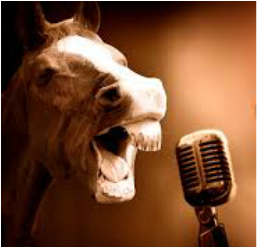
I guess all songs is folk songs. I never heard no horse sing 'em.
Big Bill Broonzy
Big Bill Broonzy
